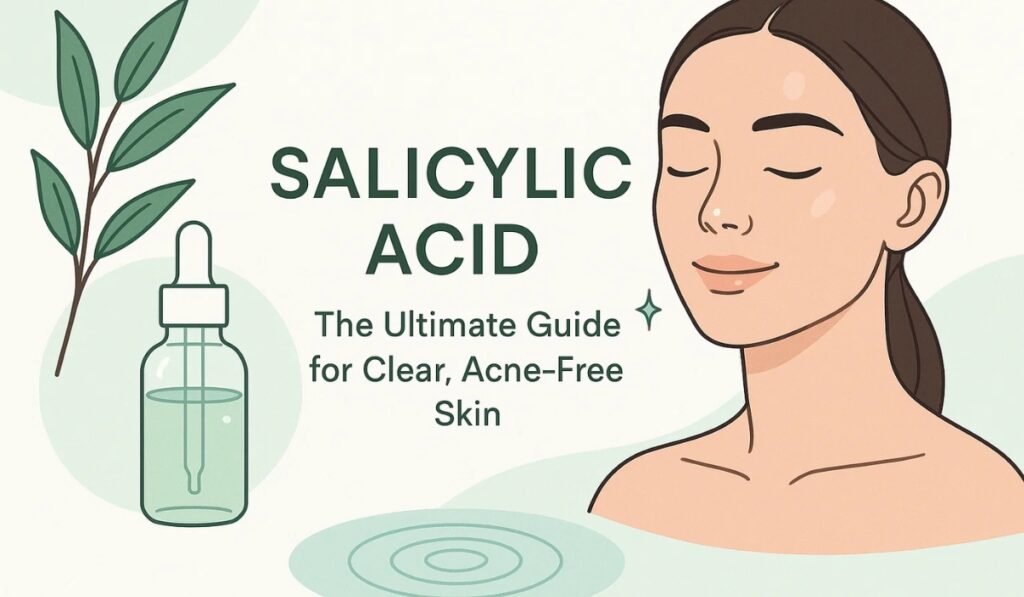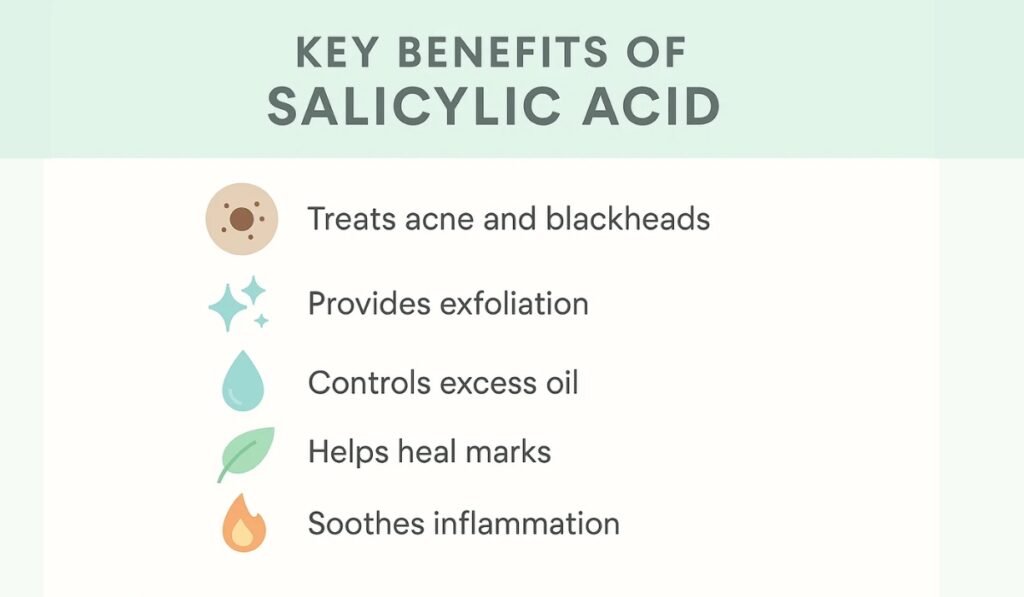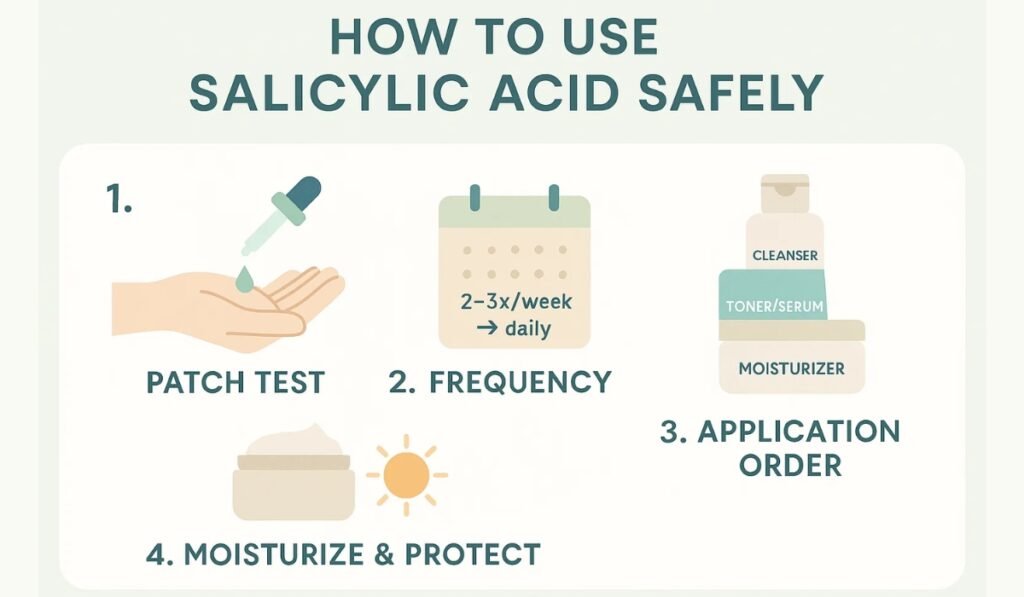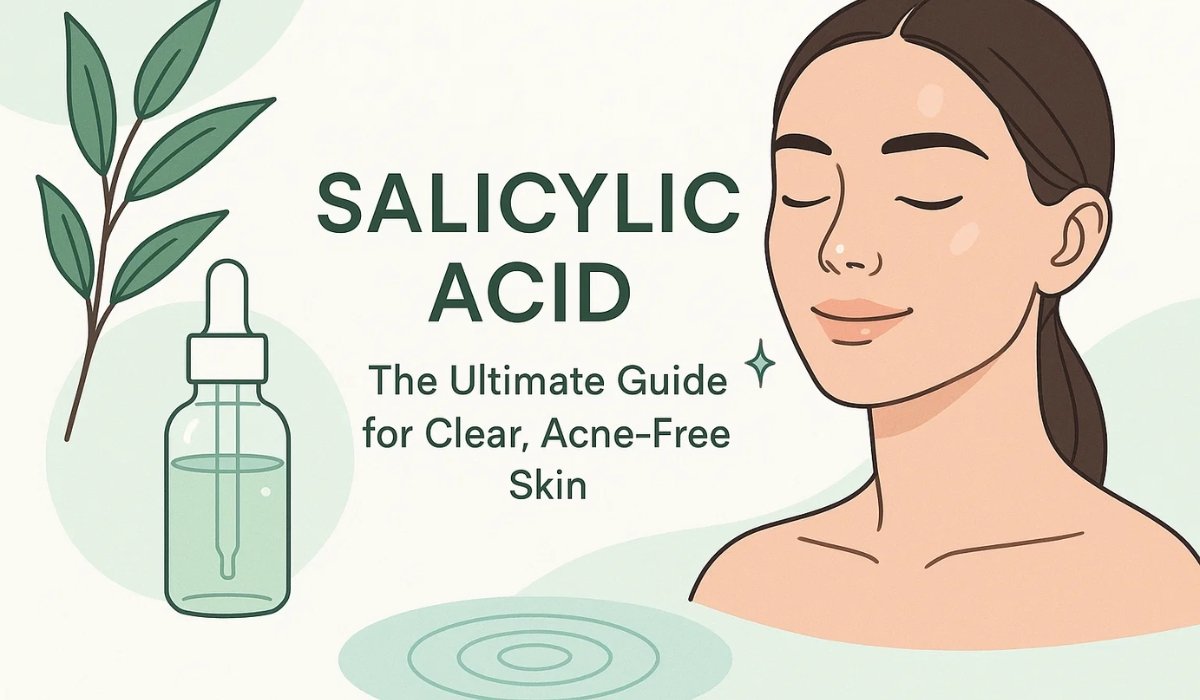If you’ve ever battled acne, blackheads, or oily skin, chances are someone has recommended salicylic acid. This powerhouse ingredient has been trusted by dermatologists for decades — and for good reason. It dives deep into your pores, clears out gunk, and keeps breakouts at bay.

But with so many products and advice floating around, it’s easy to feel confused. Should you use it daily? Does it work for sensitive skin? Can you combine it with retinol or vitamin C?
This complete guide to salicylic acid will answer all your questions, explain how it works, and help you decide if it’s the right fit for your skincare routine.
🔬 What Is Salicylic Acid?
Salicylic acid is a Beta Hydroxy Acid (BHA) derived from willow bark. Unlike Alpha Hydroxy Acids (AHAs) — which exfoliate the surface of the skin — This is oil-soluble, meaning it penetrates into your pores to dissolve sebum (oil) and dead skin cells.
That makes it particularly powerful for people who struggle with:
- Blackheads & whiteheads
- Clogged pores
- Excess oil production
- Mild to moderate acne
It’s also a keratolytic, which means it softens and breaks down keratin (the protein in skin), helping to unclog and smooth rough patches.
🌟 Key Benefits of Salicylic Acid
Here’s why dermatologists love this ingredient:
- Clears Acne & Blackheads 🟤 → Breaks down the debris inside pores and prevents new breakouts.
- Exfoliates Dead Skin Cells ✨ → Promotes a smoother, brighter skin texture.
- Controls Oil Production 💧 → Reduces shine and greasy appearance.
- Fades Post-Acne Marks 🌿 → Speeds up cell turnover to lighten scars over time.
- Calms Redness & Inflammation 🔥 → Soothes irritated breakouts thanks to anti-inflammatory properties.
- Prevents Future Pimples 🚫 → By keeping pores clean, it reduces the chances of new flare-ups.

🧴 Types of Salicylic Acid Products
It comes in different forms. Choosing the right one depends on your skin type and concern.
| Product Type | Best For | Strength | How to Use |
|---|---|---|---|
| Cleansers | Beginners, sensitive skin | 0.5% – 2% | Use daily, wash off |
| Toners/Exfoliating Liquids | Oily, congested skin | 1% – 2% | Swipe with cotton pad after cleansing |
| Serums | Stubborn acne & blackheads | 2% | Leave-on treatment, 2–4 times/week |
| Spot Treatments | Active pimples | 2% – 5% | Apply directly on pimples |
| Masks/Peels | Deep exfoliation | 2% – 10% (at-home); higher in clinics | Weekly or as directed |
👉 Pro Tip: Start with a cleanser or toner, then move up to serums once your skin adjusts.
⚖️ Salicylic Acid vs Other Skincare Ingredients
Salicylic acid doesn’t work in isolation. Here’s how it compares to — and pairs with — other popular actives.
| Ingredient | Works Best For | Action | Can Be Combined? |
|---|---|---|---|
| Salicylic Acid (BHA) | Oily, acne-prone skin | Deep pore exfoliation | Yes, but avoid layering with retinol |
| Glycolic Acid (AHA) | Dull, uneven texture | Surface exfoliation | Yes, alternate nights |
| Lactic Acid (AHA) | Dry, sensitive skin | Gentle exfoliation | Yes, very mild combo |
| Niacinamide | Pigmentation, barrier repair | Strengthens skin barrier | Excellent combination |
| Vitamin C | Brightening & anti-aging | Antioxidant protection | Use in morning, salicylic at night |
| Retinol | Wrinkles & acne | Boosts cell turnover | Use on alternate nights |
🛠 How to Use Salicylic Acid Safely
Using incorrectly can backfire. Here’s a step-by-step guide:
✅ Step 1: Patch Test
- Apply a small amount to your jawline or wrist.
- Wait 24–48 hours for any reaction.
✅ Step 2: Frequency
- Beginners → 2–3 times per week.
- Advanced users → Daily use (if skin tolerates).
✅ Step 3: Application Order
- Cleanser
- Salicylic Acid (toner/serum)
- Moisturizer
- Sunscreen (AM only)
✅ Step 4: Moisturize & Protect
- Always follow up with moisturizer to prevent dryness.
- Never skip sunscreen during the day.

🚫 Who Should Avoid Salicylic Acid?
- Pregnant or breastfeeding women (consult your doctor first).
- People with very dry, sensitive, or eczema-prone skin.
- Those already on strong acne medications (like isotretinoin, Accutane).
📋 Do’s & Don’ts of Using
✅ Do’s
- Start with low concentrations (0.5–1%).
- Use at night for maximum effectiveness.
- Always wear SPF during the day.
- Combine with hydrating ingredients (hyaluronic acid, niacinamide).
❌ Don’ts
- Don’t mix directly with retinol or strong acids.
- Don’t overuse — it can lead to irritation and peeling.
- Don’t skip moisturizer, even if you have oily skin.
💡 Best Skin Routine
For Oily & Acne-Prone Skin
- AM: Gentle cleanser → Niacinamide serum → Lightweight moisturizer → Sunscreen
- PM: Salicylic acid toner/serum → Moisturizer
For Dry Skin with Breakouts
- AM: Hydrating cleanser → Hyaluronic acid serum → Rich moisturizer → Sunscreen
- PM: Salicylic acid cleanser (2–3x/week) → Moisturizer
For Sensitive Skin
- Stick to this cleansers only (wash-off formula).
- Avoid leave-on serums unless recommended by dermatologist.
❓FAQs
1. Can I use salicylic acid daily?
Yes, if tolerated. Start slow, then increase frequency.
2. Is it safe for sensitive skin?
Low-strength cleansers are safer than serums. Always patch test.
3. Can I combine salicylic acid with retinol?
Not in the same routine. Alternate nights work best.
4. How long until I see results?
4–6 weeks for breakouts, 8–12 weeks for scars.
5. Can salicylic-acid remove acne scars?
It helps lighten marks, but deeper scars may need chemical peels or microneedling.
6. Should I use it in the morning or night?
Night is better, but cleansers can be used AM & PM.
7. What concentration is best?
Beginners → 0.5–1%
Acne treatment → 2%
Professional peels → Higher % (only by dermatologists)
8. Can I use it with sunscreen?
Yes! In fact, sunscreen is essential to prevent irritation and pigmentation.
9. Does it help with fungal acne?
Yes, salicylic acid has antifungal properties and can reduce fungal breakouts.
10. Can teenagers use it?
Yes, but start with low concentrations and only if acne is present.
🌟 Final Takeaway
salicylic acid is a tried-and-true skincare hero for anyone battling acne, clogged pores, or oily skin. With consistent use, it clears breakouts, reduces oil, and leaves skin smoother and brighter.
👉 Remember:
- Start slow, build up gradually.
- Always moisturize + wear sunscreen.
- Pair with gentle, hydrating ingredients.
- Consult a dermatologist for stubborn acne.
With the right routine, salicylic acid can completely transform your skin into a clearer, healthier version. 💧✨
👉 Want more expert skincare tips and advice?
Explore our Skincare Tips & Guides to keep your skin healthy, glowing, and confident every day.
Tanvir Kaur is a passionate fashion and lifestyle blogger who loves sharing practical tips on beauty, skincare, and timeless style. From festive fashion to everyday looks, and from skincare essentials to lifestyle inspirations, she helps readers discover trends that make them look and feel their best.














